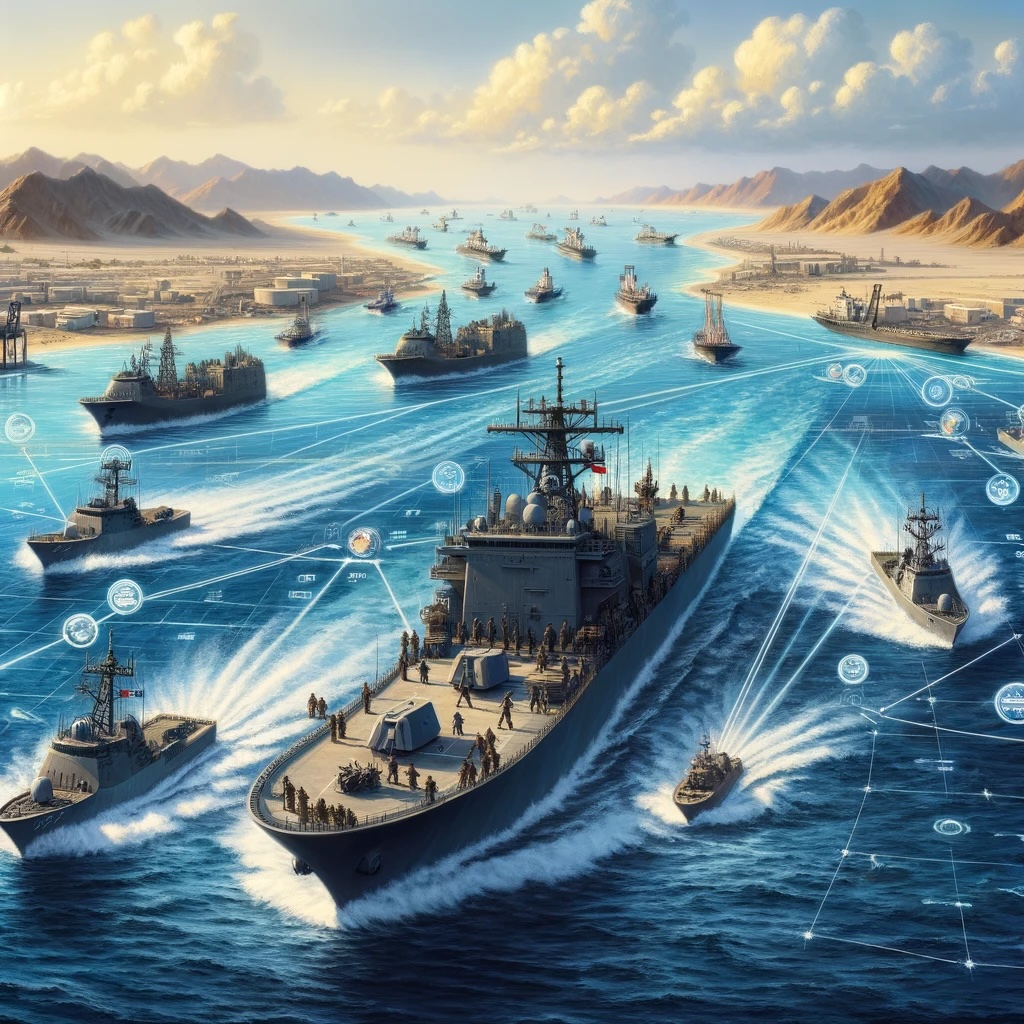3 min read
Houthi Ship Attacks Pose a Longer-Term Challenge to Regional Security and Trade Plans
By: The Washington Institute on July 17, 2024 at 8:00 AM

The Washington Institute has reported an escalating threat to commercial shipping in the Red Sea, particularly since the onset of the Gaza war and Operation Prosperity Guardian.
The Houthi group, responding to the conflict in Gaza, has intensified its attacks on maritime vessels, posing a significant challenge to the U.S.-led coalition and the European Union Naval Force Aspides, both of which have struggled to mitigate these threats.
Increasing Incidents and Impact
In the five months following the initiation of military strikes in Yemen by the U.S. and Britain, over 100 new incidents have been documented. These include naval interceptions of Houthi weapons and several increasingly sophisticated and deadly attacks. On June 12, a bulk carrier was severely damaged by an uncrewed surface vessel (USV) and subsequently sank, resulting in the death of a seafarer. The next day, a cargo ship was attacked with missiles, leading to serious injuries and the crew abandoning the vessel.
The rising dangers have led multiple shipping companies to reroute, causing a significant decline in traffic through the Bab al-Mandab Strait, a crucial shipping passage. From June 10 to 16, traffic was down by over 50% compared to the same period last year. The persistence of the Gaza conflict, or an escalation between Israel and Hezbollah, could further exacerbate these disruptions.
Strategic and Economic Implications
While the immediate effects on maritime trade are evident, the broader and more entrenched Houthi threat warrants attention. The group's ability to disrupt global commerce is likely to embolden them, regardless of a potential ceasefire in Gaza. This ongoing threat poses a critical challenge for U.S. regional partners, especially those aiming to become global logistics hubs.
Evolving Houthi Strategies
On May 16, following Israel's offensive in Rafah, the Houthi leader announced a more aggressive fourth stage of escalation. This phase involves targeting all vessels associated with companies trading with Israel, irrespective of their destinations. Consequently, many attacks have been intercepted by Western forces, yet the frequency of attacks remains high. Since May 23, the Houthis have launched numerous strikes, primarily in the southern Red Sea and the Gulf of Aden.
The Houthis have targeted various Greek-based companies, including Eastern Mediterranean Maritime Limited (EASTMED) and Evalend. For example, the vessel Tutor (IMO 9942627), owned by Evalend, sank after multiple USV and missile attacks. Despite Western military efforts, the Houthis continue to assert control over the region, challenging fundamental principles of freedom of navigation.
Adaptation and Future Risks
Shipping companies still operating in the Red Sea have taken unusual measures to avoid attacks, such as altering their Automatic Identification System (AIS) data to signal non-affiliation with Israel. However, even these tactics have not entirely shielded them from targeting.
The Houthi campaign has significantly disrupted global shipping. Major firms like the Mediterranean Shipping Company (MSC) and Maersk have avoided the southern Red Sea, leading to a 55% drop in container ship transits through the Bab al-Mandab Strait. This disruption has particularly impacted key Saudi Arabian ports, such as King Abdullah Port and Jeddah.
In May 2023, Maersk announced a new ocean service connecting Middle Eastern markets to Europe. However, by December, ongoing Houthi attacks forced the company to reroute vessels around the Cape of Good Hope, citing increased risks and costs. MSC has faced similar challenges, with its vessels being directly targeted due to erroneous perceptions of Israeli connections.
Strategic Considerations for Saudi Arabia and Regional Stability
Saudi Arabia and other regional states must prepare for an indefinite threat to their critical infrastructure. The Houthis, possibly with Iranian support, could further escalate their maritime attacks, especially in the context of political developments such as a potential Israel-Saudi normalization agreement.
Stability in the Red Sea is vital for Saudi Arabia's Vision 2030 strategy, which includes expanding its logistics sector. Riyadh aims to enhance its ports' competitiveness and international connectivity. However, achieving these goals requires a stable maritime environment, which is currently compromised by the Houthi threat.
Projections indicate that the current campaign may persist through the year, with commercial vessels avoiding the Gulf of Aden and southern Red Sea until at least 2025. Even with a Gaza ceasefire, the Houthis may not entirely halt their attacks, maintaining pressure on global supply chains and maritime traffic.
Conclusion
To counter the long-term Houthi threat, Washington and its allies must integrate this issue into their military planning. The departure of the USS Dwight D. Eisenhower carrier strike group from the Red Sea highlights the need for continued vigilance. If the Houthi escalation continues, Western naval forces may need to deploy additional assets to protect commercial shipping and uphold maritime security in the region.
Source: The Washington Institute
Related Posts
Once again, Pacific security is Japan’s priority
Japan, emerging from World War II, embraced post-war reconstruction and economic development,..
Iran Says It Seized Panama-Flagged Tanker For..
Iran's Islamic Revolutionary Guards Corps (IRGC) has detained a Panama-flagged oil tanker in the..
Pentagon: No ‘Drop’ in Iran Threat to Ships, As..
More than a month after the Pentagon announced it was sending Air Force F-35s, thousands of U.S...




